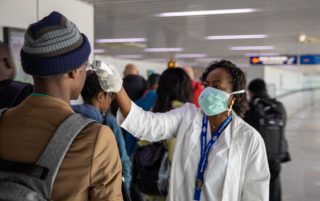On Monday, March 16, 2020, Kenyan authorities raided a shop suspected to be selling fake coronavirus testing kits to locals in the capital, Nairobi.
Ten people who are employees of the Avane Cosmetic Dermatology Clinic and Medical Spa in Nairobi were detained and nabbed by the police after raiding the facility whose advertisement for the sale of coronavirus testing kits went viral on social media.
In the advertisement, the spa was offering old coronavirus testing kits for sh600 a piece and even provided a till number through which payment for the kits could be channelled. Part of the advertisement also read that “only 400 from the 1,000 Unit Stock remained” so people should quickly make the online purchase.
The standard newspaper reported that the Chief Executive Officer of Kenya Medical and Practitioners and Dentists Board (KMPDC) Daniel Yumbya said that since “they are left with 400, we want to know who the 600 were sold to.”The raid which was led by the KMPDC, also incorporated officers from the Directorate of Criminal Investigations, the Kenya Pharmacist and Poisons Board (KPPB) and the Kenya Medical Laboratory Technicians and Technologist Board.
Yumbya affirmed that “all tests related to the COVID-19 are conducted at the Kenya Medical Research Institute. Anyone who wants to sell the kits must seek a license from the pharmacy and poisons board. So far, no license has been issued.” Similarly, a Senegalese innovation lab is in partnership with the UK to develop a 10-minute coronavirus test kit. If successfully developed and validated, it will be a much faster way to test and diagnose COVID-19, likewise distributed to African countries and across the globe.
The raid and arrests took place a day after President Uhuru Kenyatta warned the public against spreading false news about the virus. Usually, when a pandemic hits there is a huge possibility that people will make irrational decisions which they believe will keep them safe. Fraudsters and swindlers usually capitalize on this vulnerability leading to more mayhem in the society. People are therefore advised to tread cautiously and adhere to directives only from their individual authorities.
Kenya which confirmed its first case of COVID-19 last week Friday and recorded a total of three cases on Tuesday morning. President Kenyatta said that his government was suspending travel from any country with reported COVID-19 cases. “only Kenyan citizens, and any foreigners with valid residence permits, will be allowed to come in, provided they proceed on self-quarantine,” Kenyatta told the East African nation in a televised address on Monday.
Similarly, schools should close immediately and universities by the end of the week, he added. Citizens would be encouraged to make cashless transactions to cut the risk of handling contaminated money.








